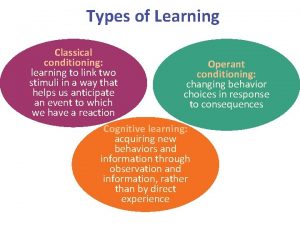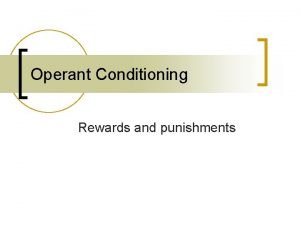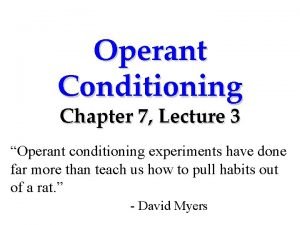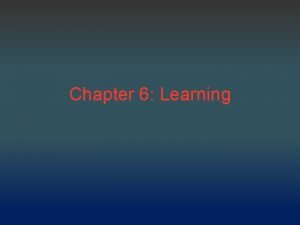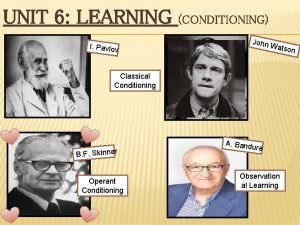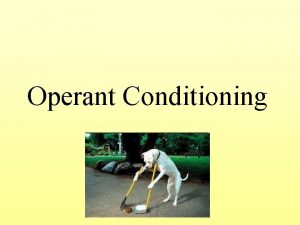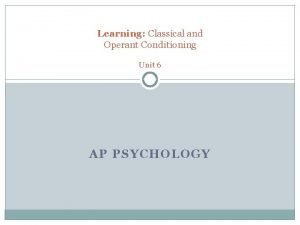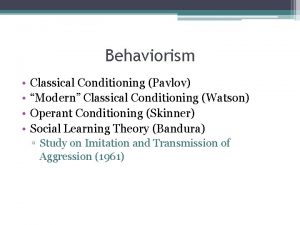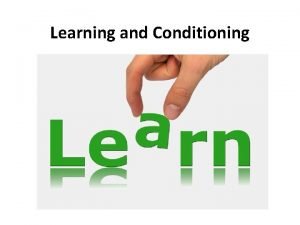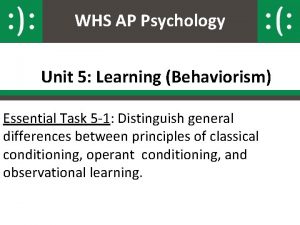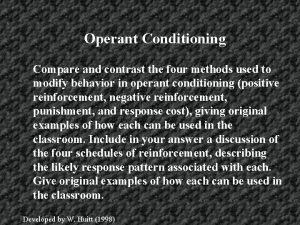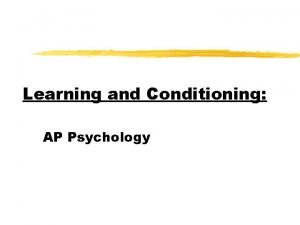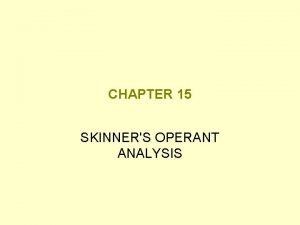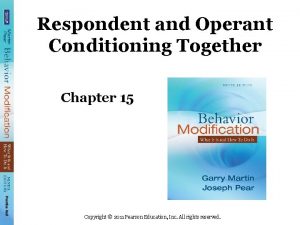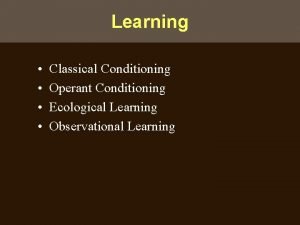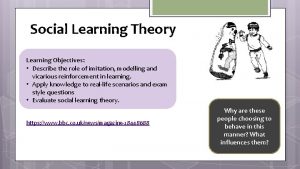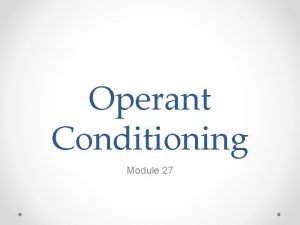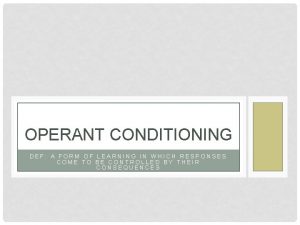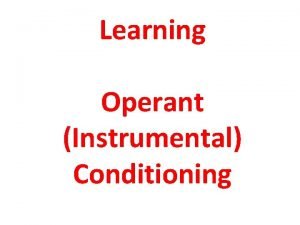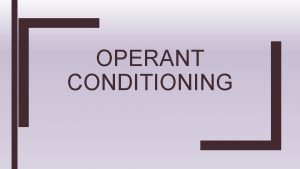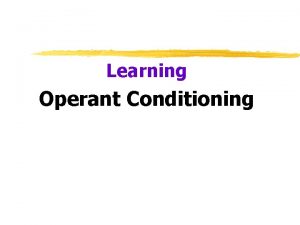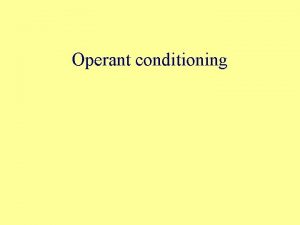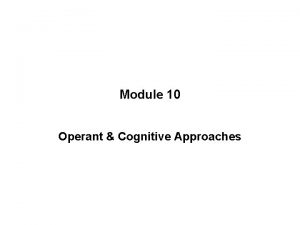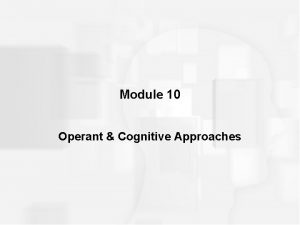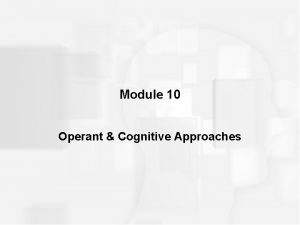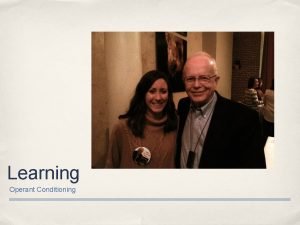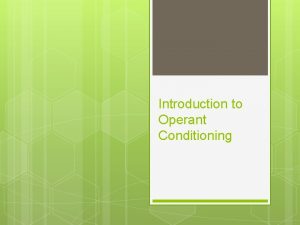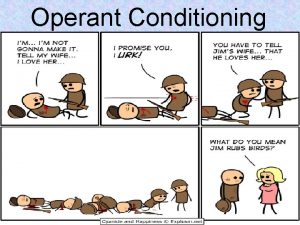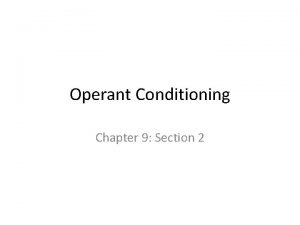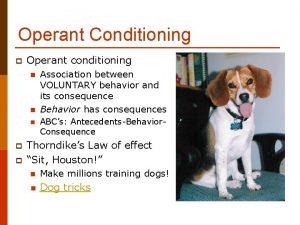Theoretical Approaches and Questions in Operant Conditioning Psychology





















- Slides: 21

Theoretical Approaches and Questions in Operant Conditioning Psychology 3306

Responses and reinforcers • How important are responses and reinforcers? • Thorndike and Skinner would say that it is essential • Tolman said ‘umm, not completely • Cognitive maps • Latent learning

So you don’t need a reinforcer? • Perhaps it strengthens the S-R bond, but is not necessary • Maybe it becomes part of a representation? • Colwill and Rescorla, 1985 • Chain - > water • Lever - > food • Food - > poison

That sound you hear is Skinner spinning in his grave • Rats won’t press the lever! • Therefore, the response and reinforcer have been connected, but not directly • It seems that associations are made between all three parts of the three term contingency

Are there 2 types of learning? • Yes, operant and classical • No, it is all associative learning • What a stupid question….

Pushing the limits • Heart rate conditioning • Biofeedback • Not always successful

So what is a reinforcer? • • • Some event that increases the likelihood of…. ENOUGH! Maybe it is need or drive reduction? Premack’s ideas Is food the reinforcer, or is it the act of eating?

Premack’s principle • Given 2 responses arranged in an operantconditioning procedure, more probable behaviors will reinforce less probable behaviors; less probable response will not reinforce more probable ones

Premack (1963) - study in Cebus monkeys Lever Pressing (L) : highest probability Door Opening (D) : medium probability Plunger Pulling (P) : lowest probability reinforces D; L reinforces P; P does NOT reinforce either D or L, etc. • “Premackian reinforcers”: activities that act as reinforcers (reading, playing) • Useful (and less costly) in token economies than object-based reinforcers • • •

Applications • Mitchell & Stoffelmayr (1973) use Premack’s principle in schizophrenics • Reinforcement items like candy, cigarettes, etc. usually not effective in schizophrenic patients • Sitting is a highly probable behavior in negative-symptom schizophrenics (catatonia, social withdrawal) • therapists made sitting contingent on doing small amount of work or activity; improved their negative symptoms • In unruly nursery-school children, high probability behaviors (running around, screaming) made contingent on low probability behaviors (sitting quietly, paying attention)

Behavioural economics • • Open economies Closed economies Elasticity of demand And behavioural ecology

Stimulus Control • Relationship between S and R • Reynolds (1961) - Attention in the pigeon • 2 pigeons reinforced for pecking to compound stimulus of white triangle on red background projected on response key • rate of pecking was then observed in each subject to a white triangle and a red background singularly


Why do you get a gradient? • Sort of the study of generalization and discrimination • How do you get data? – Probe trials – Test phases – Both done in extinction • Is it a property of the nervous system? – Pavlov – Hubel and Wiesel

Perhaps it is learning? • Lashley and Wade figured it was how the animal was trained • Borne out by Jenkins and Harrison’s work • Non differential • Presence absence • Explicit training


Duck you • Peterson (1960) and his ducklings, only saw yellow • They did not show gradients with colour! • Oops • Probably depends on the modality and the species being tested really • Or, could be relational Kohler and his chickens

• Gonzalez, Gentry, & Bitterman (1954) - chimpanzee had to pick among 9 squares of varying sizes • Squares 1, 5, & 9 presented, subject reinforced for choosing # 5 (intermediate size) • on test trial chimp reinforced no matter which square chosen • if given 4, 7, & 9 relational theory says subject will choose # 7, absolute theory says subject will choose square closest # 5 ( # 4) • subjects usually chose the intermediate size square of whichever three squares were presented

Peak Shift

OK, so that is odd • • Why does that happen? Excitatory gradient Inhibitory grandient As the Violent Femmes would say, you gotta add it up

Bird brain is not an insult • • • Concept learning Natural needed? How long lasting Delius (1982) Honig and Stewart (1988) The field of comparative cognition really grew out of much of this stuff
 Associative learning
Associative learning Instrumental learning vs classical conditioning
Instrumental learning vs classical conditioning Classical conditioning v. operant conditioning
Classical conditioning v. operant conditioning Classical and operant conditioning.
Classical and operant conditioning. Classical conditioning vs operant conditioning
Classical conditioning vs operant conditioning Operant vs. classical conditioning
Operant vs. classical conditioning Fixed vs variable psychology
Fixed vs variable psychology Classical vs operant conditioning
Classical vs operant conditioning Classical conditioning vs operant conditioning
Classical conditioning vs operant conditioning Operant conditioning classical conditioning
Operant conditioning classical conditioning Taste aversion ap psychology definition
Taste aversion ap psychology definition Fixed interval schedule example
Fixed interval schedule example Classical conditioning ap psychology
Classical conditioning ap psychology Operant conditioning and personality
Operant conditioning and personality Respondent and operant conditioning
Respondent and operant conditioning Classical conditioning examples
Classical conditioning examples Home youtube
Home youtube Social learning theory
Social learning theory Skinner experiment
Skinner experiment Thorndike puzzle box
Thorndike puzzle box Operant conditioning examples positive reinforcement
Operant conditioning examples positive reinforcement Fixed interval
Fixed interval
